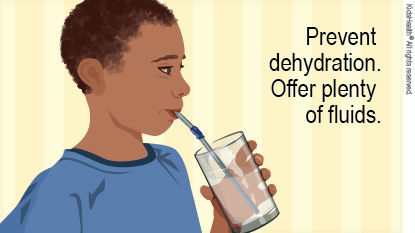Diarrhea: How to Care for Your Child
Diarrhea is poop that's loose, watery, or happens a lot. Kids who have diarrhea lose a lot of fluid from the body through their poop. They might also vomit (throw up) or have a fever. If too much fluid is lost, they can get dehydrated (not have enough water in the body). Most of the time, diarrhea goes away on its own in a few days. Until your child fully recovers from diarrhea, offer plenty of fluids to replace those that are lost.


Giving Liquids
-
Give an oral rehydration solution to replace lost fluids. It has the right amount of water, sugar, and salt for kids. Brand names include Pedialyte® and Enfalyte®, and many stores also have a store brand. You can buy it at drugstores or supermarkets without a prescription. Offer it in frequent, small amounts by syringe, spoon, or cup. A child who isn't throwing up can drink as much as they would like. You also can give frozen electrolyte pops.
-
Don't offer juice, sodas, or sports drinks. They can make diarrhea worse.
Giving Food
-
It may take time for your child to feel like eating solid foods. Offer their regular diet as soon as they feel comfortable.
-
Only change your child's diet if told to by your health care provider. You may need to remove some foods, like greasy or fried foods, from the diet.
-
Ask your health care provider if you should give foods high in probiotics ("good" bacteria), such as yogurt, to help with digestion.
Medicines
-
Don't give medicine for the diarrhea unless your health care provider prescribed it. Medicines that slow down diarrhea can cause problems like sleepiness or belly pain, and may be unsafe for kids and teens.
-
You can give medicine for fever if your health care provider says it's OK. Use these medicines exactly as directed:
-
acetaminophen (such as Tylenol® or a store brand)
-
ibuprofen (such as Advil®, Motrin®, or a store brand). Do not give to babies under 6 months old.
-
Don't give aspirin to your child or teen. It's linked to a rare but serious illness called Reye syndrome.

Your child:
-
has diarrhea that gets worse
-
develops a new fever
-
vomits (throws up) more than once or twice
-
has blood or mucus in the poop, or poop that is black and looks like tar

Your child:
-
can't drink fluids
-
has severe or worsening belly pain
-
appears dehydrated; signs include dizziness, drowsiness, dry or sticky mouth, sunken eyes, crying with few or no tears, or peeing less often (or having fewer wet diapers)

What causes diarrhea? Infections in the intestines cause most cases of diarrhea. Germs that can cause an infection include:
-
viruses (viral gastroenteritis, also known as "stomach flu," is the most common cause of diarrhea in kids)
-
bacteria (bacteria are often the cause of food poisoning)
-
parasites
Sometimes diarrhea can be unrelated to germs. This can happen in kids who eat or drink too much sugar (like juices), or who have food allergies or intolerances. It also can happen as a side effect of some medicines.
How can we prevent the spread of germs that cause diarrhea? Remind everyone in your family to wash their hands well and often. They should wash for at least 20 seconds with soap and water. This is especially important after using the bathroom and before preparing or eating food.
Other ways to prevent the spread of germs:
-
Keep your child out of school or child care until the diarrhea has been gone for 24 hours. Also keep your child out of swimming pools until it has passed.
-
Clean objects and surfaces regularly, especially doorknobs and other things that get touched a lot.
-
Wash fruits and vegetables well before eating them.
-
Clean kitchen counters and cooking utensils well after they've been in contact with raw meat.
-
Refrigerate meats and fish as soon as you bring them home from the store and cook them well. Refrigerate leftovers as soon as possible after cooking.
-
Avoid drinking from streams, springs, or lakes.